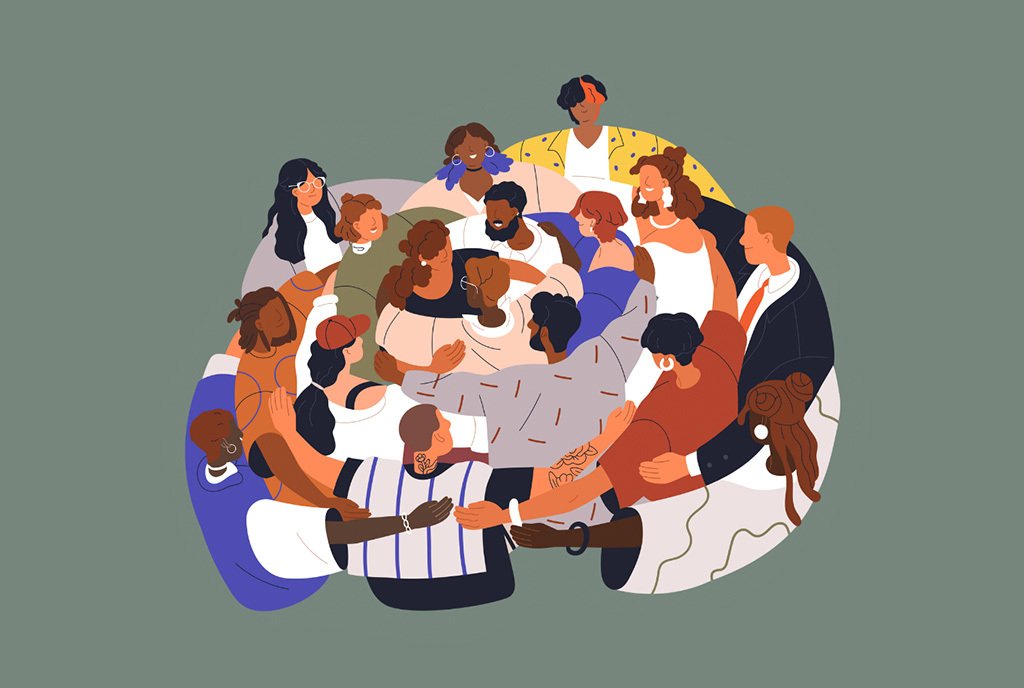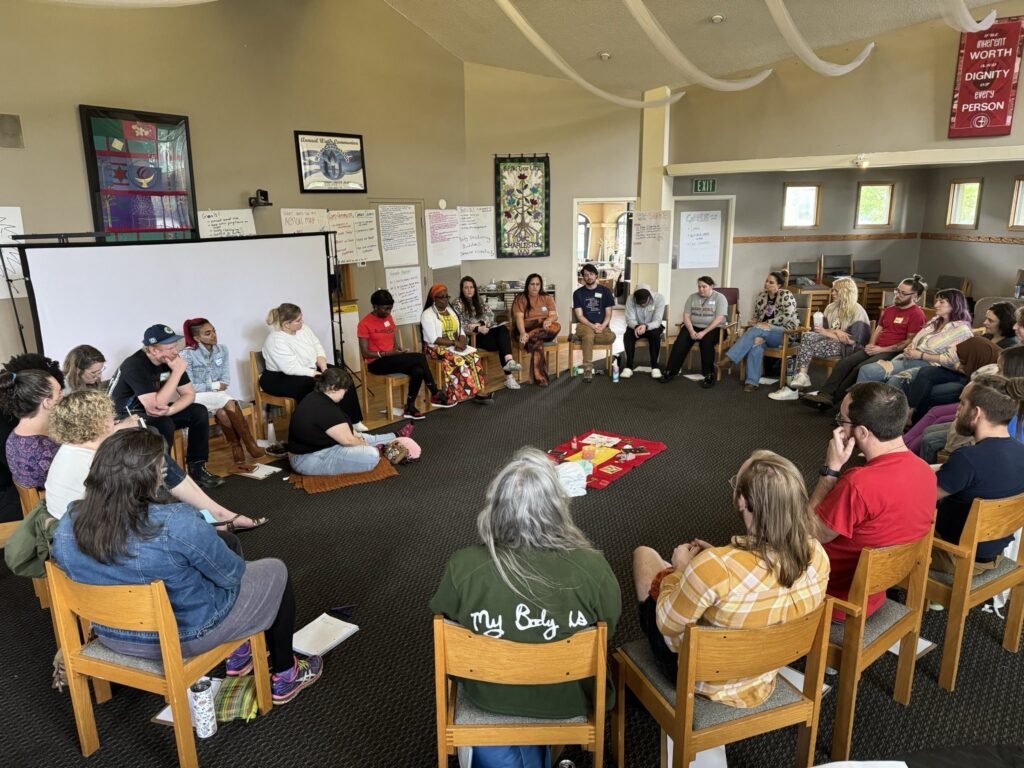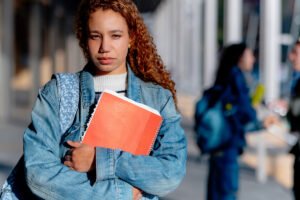
In my role at Solidaire, a progressive donor network, I have the honor of stewarding our Janisha R. Gabriel Movement Protection Fund (MPF), which is dedicated to enhancing the legal, physical, and digital security of frontline organizers, while supporting their community, cultural, and spiritual wellness. Established in 2020 in response to urgent calls from movement partners facing heightened security attacks from the state, institutions, and vigilantes, we’ve since provided $4.5 million to 150 groups facing security threats for rapid response resources as well as to support safety infrastructure and programs for collective care and healing.
Through this work, I’ve learned from people innovating methods to protect our movements, revealing winning strategies, and inspiring hope for our collective safety. As our nation faces escalating political violence and repressive legislation, I’m grounding myself in the wisdom of these movements, amplifying their optimism that we can strengthen sectorwide readiness, and fostering trust among coalitions toward a secure future for all.
Take Care of Your People
“Plan for your worst fears, instead of waiting for them,” was the stark advice from Alesandra Candelaria of Three Sisters Collective, a Pueblo/Indigenous women-led grassroots organization based in O’ga P’ogeh (Santa Fe). On September 28, 2023, during a prayer gathering to celebrate the postponement of the reinstallation of a statue commemorating a Spanish conquistador known for atrocities against the Pueblo peoples, a White supremacist shot and critically injured Jacob Johns, an Indigenous artist and activist.
In the wake of this violence, the collective developed systems for safer engagement. After a period of mourning and healing, members participated in the Transforming Conflict cohort with Vision Change Win, learning holistic community safety and security strategies. This spring, they applied their training during their first public event since the shooting—a farm blessing—collaborating with local organizations on security measures.
Through its Intersectional Fridays program, the collective deepens community ties by inviting diverse community members to their farm for workshops and political education, fostering connections with both the land and each other. “Our relationships strengthen security through solidarity and comradeship,” explained Dr. Christina M. Castro, a cofounder of the collective. When Johns was injured, she recalls, “Our partners we met through Intersectional Fridays were the ones who got the medic pack and pressed it on Jacob’s body while we waited for paramedics to come. We have a lot of community support, and folks are looking out for and believing in us—that is community safety.”
Her advice to other organizations: focus on relationships. “Take care of your people. When people show up, acknowledge the time they take to be in community with you. This is your chance to foster a healing, loving, beloved community. You have to work on relationship building for community safety.”
Scaling Physical and Digital Security
“Plan for your worst fears, instead of waiting for them.”
In 2020, organizers with West Virginia Can’t Wait helped 11 community leaders win elected offices. However, they soon faced harassment and threats from right-wing sources, and quickly realized their need for security was more urgent than anticipated. Co-chair Stephen Smith notes that they had to build a security program from scratch but used this as an opportunity to engage and activate less-involved members.
They began with physical security initiatives and mental health programs for organizers with the help of their network. The proactive approach to risk assessment and security plans, particularly while supporting two transgender mayoral candidates and allied community organizations, saved lives on multiple occasions. “Individuals are being targeted because of the effectiveness of their work. We are offering them a life raft,” said Smith.

To broaden its impact, the organization launched the Community Defender program, training 27 people from five states in security, harm reduction, and de-escalation. Participants came from diverse organizations, including homeless shelters and a queer youth summer camp. In the six months following the training, staff at a participating homeless shelter have not handed anyone over to the police—a testament to the program’s success.
Smith emphasized the need for movements to develop their own security, safety skills, and networks, urging them to view it as a communal act of care and solidarity. “The carceral system has cruelly tried to convince us that safety and security ought to be imposed by so-called experts who come from outside our communities,” said Smith “But the best solutions for safety and security come from our own community members.”
Safety Means Freedom to Thrive
For 20 years, the Miss Major Alexander L Lee TGIJP Black Trans Cultural Center (TGIJP) has been building power and leadership among transgender, gender variant, and intersex people. The group works across the country, serving individuals inside and outside the legal and immigration systems. Through case management, subsidized housing, and wellness and health services, people receive help reentering society after being incarcerated. The center also organizes a freedom school to help community members learn, organize, and transform the systems that impact them.
“Reentry must come with a paycheck. Period. Not volunteer. We look at the socioeconomic systems and the intersections for Black trans people,” explained Janetta Johnson, CEO of TGIJP. “Black trans women are so often vulnerable to violence because we don’t have economic justice or the opportunity to contribute to our families….You can see the difference when people transition out [of incarceration] with support; they’re able to stay out. That’s how we keep our community safe.”
The center’s national conference, Black Girlz Rulez, is “our way of coming together and synthesizing our political commitment to the most marginalized of us, which automatically focuses us to Black trans siblings living in the Deep South,” said zy’aire nassirah, co-executive director. “So often Black trans folks in the South have to travel somewhere else for resources. Black Girlz Rulez is a way to build community, foster critical connections, and create modes of Black trans joy, so folks can grow and thrive in their community.”
This becomes even more relevant now with record numbers of murders of Black trans women and people, as well as a surge in anti-trans legislation. In six listening sessions over two years, community members reported facing a war launched against their bodies and lives. For instance, in Florida, under the state’s bathroom ban, trans people are subject to arrest and fined for using a public restroom. As a result, TGIJP launched the Transgender People in Florida Prisons Project with local organizers so people can understand how anti-trans legislation impacts them and build power to fight against these laws.
Johnson urged that safety for Black trans communities “means more than just freedom from discrimination and violence—it includes the dignity to support our families and gracefully overcome the traumas inflicted upon us.” Providing resources to marginalized communities can be transformative.
Sign up for our free newsletters
Subscribe to NPQ's newsletters to have our top stories delivered directly to your inbox.
By signing up, you agree to our privacy policy and terms of use, and to receive messages from NPQ and our partners.
Combating Lawfare
Digital and physical threats aside, movement groups also contend with increasingly repressive legislation. The Senate may soon consider a bill that would enable the Treasury Department to revoke the tax-exempt status of individual nonprofits and label them as “terrorist supporting” without due process. This bill, if enacted, would empower the government to silence dissent.
In response, organizers at Muslims for Just Futures (MJF) are mobilizing by petitioning and working with attorneys to develop and conduct Know Your Rights training.
“It’s not fair how much grassroots groups are forced to handle, but we remain on the frontline to combat the dehumanization.”
“The legal infrastructure in our space is at capacity due to the surge of cases against students and activists advocating for Palestinian liberation,” explained Darakshan Raja, the group’s founder and executive director.
“Movement-aligned legal advocacy groups are stretched thin as the war on terror apparatus is weaponized against a range of movements. Activists working against Cop City, for abortion rights, and for racial justice, who are being labeled as ‘Black liberation extremists’ are facing repression. Community power-building groups like ours are mobilizing resources and developing in-house materials and content with trusted lawyers,” Raja added.
Muslim-led groups are all too familiar with the consequences when organizations are targeted and dissent is criminalized. “We understand the mistakes made [after 9/11] and how to avoid them,” continued Raja. “People were afraid, which had a chilling effect on the sector. Philanthropy is deeply complicit in withdrawing support from funding groups who build power in Muslim communities.” However, she remained optimistic about the shifting landscape for organizations, stating, “The threats are formidable, but we are responding by deepening relationships and solidarity.”
MJF convenes partner organizations with the Building Movement Project and other partners at an advocacy and movement-building table. This initiative aims to improve coordination and communication among BAMEMSA (Black, Arab, Middle Eastern, Muslim, and South Asian) groups and organizations committed to dismantling the war on terror and countering Islamophobia. In April, MJF developed a plan to address Islamophobia and anti-Arab racism, which 96 diverse organizations endorsed. It also developed Know Your Rights resources to understand how the targeting of bail funds might affect mutual aid systems.
“Government actors have devised creative ways to repress movements, so we respond with creativity to ensure community protection and safety.”
Legal repression is a growing threat to movement safety, but MJF’s work underscores the importance of mobilizing legal support networks and educating communities on their rights. Building resilience in the face of such challenges requires strong alliances and coordinated action. “It’s not fair how much grassroots groups are forced to handle,” said Raja, “but we remain on the frontline to combat the dehumanization and criminalization of our communities. We are building an alternative world, and our safety lies in our relationships, solidarity, and care for one another.”
Building Safety through Advocacy
The Southern Center for Human Rights (SCHR), a law firm and a policy shop that works with community organizers in Georgia and the Deep South, works to build strong alliances between policy advocates and frontline communities. “We are used to fighting in the South. We know how to fight and win uphill battles,” said Terrica Ganzy, executive director of SCHR.
“Government actors have devised creative ways to repress movements, so we respond with creativity to ensure community protection and safety,” Ganzy noted. “We envision a model of community safety that transcends the limitations of the current system and are working to create the policies that will make that vision a reality.”
In 2020, when 600 people were charged with curfew violations for protesting the police murder of George Floyd, SCHR realized that the infrastructure to connect organizers to pro bono legal services was no longer sufficient during movement moments. In response, the firm launched the First Amendment Lawyer Bridge Project to recruit attorneys, connect them to funding, and provide them with a curriculum on client-centered representation and digital security. The project also gives lawyers resources to coordinate legal strategies for protestors and bail fund organizers facing domestic terrorism and RICO charges for protesting Cop City.
“We engage in community organizing to understand how laws impact everyone,” said Tiffany Roberts, public policy director at SCHR. “We need to work with and listen to communities that are often reluctant to engage with us—such as rural communities, people who are incarcerated, and survivors of vigilante violence. Policy advocates must work in collaboration with these communities rather than being extractive. We need everyone at the table, weighing in on the language and developing policies that create safety for movements and our communities.”
Collective Safety Is Possible
From Indigenous organizers to Black trans activists, a common thread emerges from these examples: the people safeguarding frontline communities and justice movements are (re)defining what safety and dignity means. This work includes enhancing physical and digital security infrastructure, defending movements against legal threats, and creating alternative policies for community safety.
For donors, organizers, and other allies, the message is clear: people can only create collective safety when each person is respected and engaged in a beloved community—nurtured by strong coalitions rooted in solidarity.







